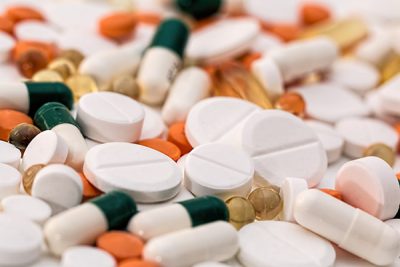
Prescription drug abuse is one of the most common forms of drug use in America. Many very strong prescription medications in the home have the potential for abuse. Many of these medications are used by swallowing, snorting, or injecting crushed pills. This is such an issue that the Drug Enforcement Agency has enacted a National Prescription Drug Take Back Day in the United States.
The Substance Abuse and Mental Health Services Administration (SAMHSA) reported in 2020 that prescription drug abuse is the fastest-growing drug problem in the United States While marijuana is still the top ‘gateway’ drug (first drug used by almost all young people), prescription drug abuse is often a young person’s first introduction to hard narcotics such as opiates, benzodiazepines, and prescription stimulants. Unfortunately, these substances are widely available as they are often in homes for legitimate reasons. Studies show that upwards of 42% of teens who have tried prescription drugs acquired them from their homes. Teens often perceive these drugs as being less risky than their street drug counterparts, but the statistics have shown that this is simply not the case.
Here at the Cornerstone Program, we understand that those dealing with prescription drug abuse themselves or with a loved one are struggling. As the leading substance abuse program for teens and young adults in Denver, CO, we are here to help. If you or a loved one is struggling with prescription drug abuse, please contact our drug rehab center for a free evaluation and a recommended course or action. Call us at (303) 690-0082 today.
Prescription Drug Abuse: Commonly Abused Prescription Drugs
Prescription drug abuse is widespread in the United States and they come in many forms. Common categories of abused prescription drugs are listed below:
- Opioids – Highly addictive and powerful, prescription painkillers (opioids) are one of the most widely abused prescription drugs. Medications used to treat pain such as oxycodone (Percocet / OxyContin), hydrocodone (Vicodin) , meperidine (Demerol), and morphine. These are chemically similar to heroin and will show similar signs and symptoms to heroin addiction
- Benzodiazepines – Often referred to as “benzo’s” by their users, these prescription drugs are depressants that are notorious for leading to overdose when combined with alcohol. Like opioids, there are many brand names – some of which are stronger than others. They are also known for having serious medical withdrawal symptoms similar to alcohol. Common benzodiazepines include alprazolam (Xanax), clonazepam (Klonopin), lorazepam (Ativan), and diazepam (Valium).
- Stimulants – Prescription stimulants are often prescribed for ADD and ADHD, and are one of the most common drugs of abuse among young people. They are chemically similar to methamphetamine, and as such, symptoms of prescription stimulant addiction will present similarly to methamphetamine addiction. Common prescription stimulants include amphetamine (Adderall), dextroamphetamine (Dexedrin), and methylphenidate (Ritalin / Concerta).
- Over the Counter Drugs – While not technically “prescription” drugs, there are a few over the counter medicines to be aware of, since most of the young people we work with have tried these at some point during their drug use. They tend to be hallucinogenic or dissociative in nature. The most common OTC drugs of abuse include dextromethorphan / DXM (Coricidin / Robitussin / Mucinex) and diphenhydramine (Benadryl). These are popular because they are often easy to shoplift from grocery stores or pharmacies.
Signs and Symptoms of Prescription Drug Abuse
If you are concerned your child or loved one may be abusing prescription drugs, take a look over this list of signs and symptoms to help clarify. It should be noted that since the drug types listed above vary vastly in their properties, it is impossible to present an exhaustive list of side effects. In general, pay attention to:
- Unmarked pills, pill bottles, or baggies of pills
- Slowed breathing
- Dilated pupils – signs of stimulant or benzodiazepine use
- Constricted pupils – signs of opiate use
- A change in sleeping patterns
- Decline in schoolwork
- Sudden changes in friend groups
- Inability (or unwillingness) to recount where they been or who they’ve been with
- A sudden increase in aggressiveness or moodiness
Prescription Drug Abuse Withdrawal
As noted above, since these drugs vary wildly in nature, it is impossible to provide a clear description of the symptoms of prescription drug use withdrawal. Our best recommendation is to review the withdrawal symptoms listed on these drugs’ corresponding street drug pages:
- For stimulants, review the withdrawal symptoms on our meth addiction page.
- For opiates, review the withdrawal symptoms on our heroin addiction page.
- For benzodiazepines, review the withdrawal symptoms on our alcohol abuse page.
Important note: In particular, Benzodiazepine withdrawals can induce seizures, hallucinations, shakes and other medical conditions / issues. If you are concerned that your loved one is using benzodiazepines, we recommend completing a substance abuse evaluation first to determine if a medical detox is necessary.
Next Steps
Responding to a loved one’s prescription drug misuse isn’t easy. We recommend you start by scheduling a no cost evaluation. We can answer your questions and make recommendations for substance abuse treatment, drug counseling, monitoring, or long-term planning. To schedule an evaluation, please contact our Denver drug rehab center or call (303) 690-0082.
